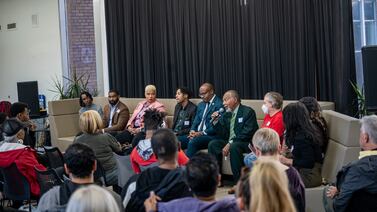School mental health professionals, safety experts, and education leaders on Tuesday voiced support for five proposed bills that aim to prevent violence in Michigan schools, saying the measures could save lives.
The bills, which come a year after the deadly mass shooting at Michigan State University and more than two years after the killings of four students at Oxford High School, would put in place more mental health support for struggling students, including creating specific service plans to meet their needs, and more stringent protocols for responding to emergencies.
The proposals also would increase oversight of threat assessment, or the process of determining whether a student poses a risk of physically harming themselves or others.
Melissa Kree, who has been a psychologist at Oxford Community Schools for 12 years, said during a hearing of the House Education Committee that the bills “have the potential to save lives” and would give districts the guidance they “desperately” seek on assessing potential threats.
“This work cannot be ignored,” she said. “The bills before you today have the potential to equip schools with the best practices and policies so that our students, staff, and families can be confident in their districts’ ability to conduct threat assessments and follow school safety protocols in a way that prioritizes both their physical and psychological safety.”
Karen Dunholter, a social worker at Southgate Community Schools, said educators want more training and guidance to make kids safer.
“People want to be trained,” she said. “We want policies and procedures so we are not doing something that we don’t know might be harmful.”
Tuesday’s hearing comes more than two years after most of the proposed legislation was introduced. Republicans have criticized Democrats for allowing the bills to languish in the Michigan Legislature since they were first introduced in 2022. Many Democrats, however, had previously said that gun reform could not be left out of conversations about school safety, and the bills do not change gun laws.
The proposed laws have support from both Democrat and Republican lawmakers.
One of the bills, co-sponsored by Rep. Kelly Breen, a Democrat from Novi, would require every public school to have a behavior threat assessment and management team that would monitor students for concerning behavior. Students who were identified as struggling would be provided with a plan for support.
The bill was based on the findings of a third-party report on the response to the Oxford shooting, which was released in October. That report concluded that the killings could have been prevented if proper threat assessment and suicide prevention were carried out by school staff and law enforcement.
Legislation introduced by Rep. Ranjeev Puri, a Democrat from Canton, would require the Michigan State Police to create standardized terminology for use during school emergencies. A related bill co-sponsored by Rep. Stephanie Young, a Democrat from Detroit, would require all schools and districts in the state to adopt that terminology, which supporters say would create less confusion during crises.
A bill authored by Rep. Nancy DeBoer, a Republican from Holland, would mandate that the Michigan Office of School Safety notify district emergency and safety managers of any tips regarding potential threats to schools in their system as soon as possible or within 24 hours. Local law enforcement would also have to be notified within that time frame.
Another bill, co-sponsored by Rep. Luke Meerman, a Republican from Coopersville, would create a permanent School Safety and Mental Health Commission in the Michigan Department of Education. The existing commission, which was created in 2022, focuses mostly on student mental health and preventing youth suicide. The bill would add more members to the commission, and those members would be experts in threat assessments.
Jason Russell, current member of the School Safety and Mental Health Commission and a former U.S. Secret Service agent, said creating universal language for schools and law enforcement to communicate during emergencies would streamline responses.
For example, school staff and law enforcement may mean different things when using phrases like “room clear.” To law enforcement, that means students are cleared from the room. Law enforcement could also give specific instructions to rapidly move from an outdoor space to inside a building with the command “reverse evacuation.”
To become law, the bills will need to move through several more steps of the legislative process. The committee has not yet voted to advance the bills. If the bills move out of committee, the House would hold a vote. Then, the bills would go to the Senate Education Committee before a vote in the Senate.
“I think we can agree, all of us, no matter what side of the aisle you sit on, that our kids have a fundamental right to a safe and respectful learning environment,” said Breen during the hearing. “And we know that if our kids are not physically or mentally safe, they cannot learn academically.”
Lawmakers avoid discussion of guns
To get bipartisan support for some of the school safety measures, lawmakers involved in writing the bills had to agree not to discuss gun reform, Breen said.
“It was clear that we could not leave politics out of any discussion involving firearms,” she said.
One Republican accused Democrats of “political grandstanding” on the issue. Rep. Angela Rigas, a Republican from Caledonia, said Tuesday in a prepared statement that such grandstanding by Democrats had caused the bills to be stuck in “purgatory.”
“Shootings have and continue to happen at Michigan schools,” she said. “It breaks my heart to see politics take the place of humanity right now.”
Since both mass shootings, Michigan has addressed school safety in different ways, both at the K-12 and postsecondary levels. The state has allocated more than $500 million toward school safety and mental health initiatives since 2022, including $328 million for school safety grants last year.
Democratic Gov. Gretchen Whitmer also signed into law several gun safety measures last year, including universal background checks and safe storage requirements. Some Republican lawmakers opposed the changes.
Breen, who has taken the lead on legislative school safety efforts, said during Tuesday’s hearing that work on the bills has been time-consuming because lawmakers have spent months meeting with experts and others to gain insight into best practices and needed improvements. The Oxford report also made lawmakers update the bills, said Breen.
Two other bills that were part of the original package on school safety legislation were not discussed in the hearing.
A bill introduced by Kathy Schmaltz, a Republican from Jackson, would make districts implement emergency plans for each school building in their system. Districts would have to update the plans every three years.
The other bill, which was introduced by Rep. Donni Steele, a Republican from Orion Township, would mandate that student identification cards list contact information for the OK2Say safety tipline.
Hannah Dellinger covers K-12 education and state education policy for Chalkbeat Detroit. You can reach her at hdellinger@chalkbeat.org.




